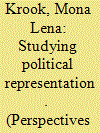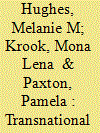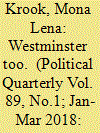|
|
|
Sort Order |
|
|
|
Items / Page
|
|
|
|
|
|
|
| Srl | Item |
| 1 |
ID:
087689


|
|
|
|
|
| Publication |
2009.
|
| Summary/Abstract |
This article makes a case for rethinking traditional approaches to the study of legislative behaviour on behalf of women by asking (1) not when women make a difference, but how the substantive representation of women occurs; and (2) not what 'women' do, but what specific actors do. The first shift aims to explore the contexts, identities and attitudes that motivate and inform substantive representation. The second seeks to move beyond a focus on female legislators to identify the 'critical actors', male and female, who may attempt to represent women as a group. In so doing, this framework calls attention to how structure and agency interact in the substantive representation of women.
|
|
|
|
|
|
|
|
|
|
|
|
|
|
|
|
| 2 |
ID:
174467


|
|
|
|
|
| Summary/Abstract |
Violence against women in politics is increasingly recognized around the world as a significant barrier to women’s political participation, following a troubling rise in reports of assault, intimidation, and abuse directed at female politicians. Yet conceptual ambiguities remain as to the exact contours of this phenomenon. In this article, we seek to strengthen its theoretical, empirical, and methodological foundations. We propose that the presence of bias against women in political roles—originating in structural violence, employing cultural violence, and resulting in symbolic violence—distinguishes this phenomenon from other forms of political violence. We identify five types of violence against women in politics—physical, psychological, sexual, economic, and semiotic—and three methodological challenges related to underreporting, comparing men’s and women’s experiences, and intersectionality. Inspired by the literature on hate crimes, we develop an empirical approach for identifying cases of violence against women in politics, offering six criteria to ascertain whether an attack was potentially motivated by gender bias. We apply this framework to analyze three cases: the assassination of Benazir Bhutto, the impeachment of Dilma Rousseff, and the murder of Jo Cox. We conclude with the negative implications of violence against women in politics and point to emerging solutions around the globe.
|
|
|
|
|
|
|
|
|
|
|
|
|
|
|
|
| 3 |
ID:
169629


|
|
|
| 4 |
ID:
110829


|
|
|
|
|
| Publication |
2012.
|
| Summary/Abstract |
The diffusion of international norms and their effects on policy and political behaviour are central research questions in international relations. Informed by constructivism, prevailing models are marked by a crucial tension between a static view of norm content and a dynamic picture of norm adoption and implementation. Observing that norms continue to evolve after they emerge, we argue that a discursive approach offers a more promising way forward for theorizing and analysing the life cycles of international norms. We present a view of norms as processes, calling attention to both 'internal' and 'external' sources of dynamism. We illustrate this theory by tracing and comparing the life cycles of two global equality norms: gender-balanced decision-making and gender mainstreaming. We find that these norms emerged from two distinct policy realms, and after briefly converging in the mid-1990s, have since developed largely separately from, and often in tension with, one another.
|
|
|
|
|
|
|
|
|
|
|
|
|
|
|
|
| 5 |
ID:
096300


|
|
|
|
|
| Publication |
2010.
|
| Summary/Abstract |
How does a comparative politics of gender improve our understanding of political representation? I map the existing feminist literature on this topic, which asks questions like why there are so few women elected to political office, whether women in politics represent women as a group, and how the presence or absence of women in politics affects voter perceptions and opinions. I then consider how scholars-both feminist and non-feminist-might generate new insights on political representation by expanding what is thought of as a "case" and what is meant by the term "gender." I recommend increasing the scope of comparison by (1) opening up the definition of a case to include a broader range of units and events and (2) connecting the study of a single unit to patterns generated by the study of other similar units. I suggest moving away from equating women with gender by exploring (1) relations between women and men and (2) the impact of masculinities and femininities on the conduct of political life. While developed in relation to research on representation, this approach offers broader advice for capturing the diverse and gendered nature of political dynamics observed around the world.
|
|
|
|
|
|
|
|
|
|
|
|
|
|
|
|
| 6 |
ID:
139535


|
|
|
|
|
| Summary/Abstract |
The rapid global spread of quotas for women constitutes one of the most significant political developments of the last thirty years. It transformed the composition of legislatures worldwide. Yet we lack a solid understanding of the forces driving quota diffusion. In this article, we consider how global pressure from the international women's movement affects national gender quota adoption. In the first quantitative analysis of this question on a global scale, we use event history techniques to examine global, transnational, and national influences on quota adoption in 149 countries between 1989 and 2008. Contributing to work on international norm diffusion, we find a crucial role for women's activism, but uncover a negative interaction between increased global pressures and domestic ties to women's transnational organizing. We suggest global pressure to adopt quotas may be weakened by the diverse agendas of women's activist organizations, by perceived threats to male elites posed by women's agitation, or both.
|
|
|
|
|
|
|
|
|
|
|
|
|
|
|
|
| 7 |
ID:
161665


|
|
|
|
|
| Summary/Abstract |
At the end of 2017, millions of women used the #MeToo hashtag to draw attention to widespread sexual harassment and assault around the world. In British politics, female politicians, staff members, and journalists opened up about their own experiences, provoking the resignation and party suspension of a number of male Cabinet ministers and Members of Parliament. This article explores how this issue got on the political agenda, what features of politics might foster harassment and discourage reporting, and what solutions might be pursued to tackle this problem. It argues that sexual harassment should be understood as a systemic, cultural problem, rather than a question of problematic individuals. Ignoring the issue of sexual harassment in politics, the article concludes, has serious consequences for gender equality—as well as for democracy itself, reducing policy effectiveness, distorting the political pipeline, and diminishing political transparency and accountability.
|
|
|
|
|
|
|
|
|
|
|
|
|
|
|
|
|
|
|
|
|